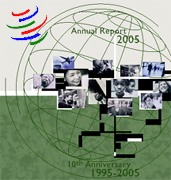 The International Organization for Standardization is the “world’s largest developer of standards,” according to the World Trade Organization’s World Trade Report 2005. The recently released report was written by WTO economists and discusses the benefits standards deliver in terms of consumer information, environmental protection and the compatibility of related goods and services.
The International Organization for Standardization is the “world’s largest developer of standards,” according to the World Trade Organization’s World Trade Report 2005. The recently released report was written by WTO economists and discusses the benefits standards deliver in terms of consumer information, environmental protection and the compatibility of related goods and services. “International standards help ensure technical compatibility across countries and convey information to consumers about products that have been produced abroad or processes that took place in another country,” the report states. “International standards thus reduce transaction costs and facilitate international trade.”
The report identifies ISO and its partners, the International Electrotechnical Commission and the International Telecommunication Union, as “the most important” of the 49 international standardizing bodies, commenting “The expansion of membership in both ISO and the IEC over recent decades reflects the growing importance of international standards.”
…
Add new comment